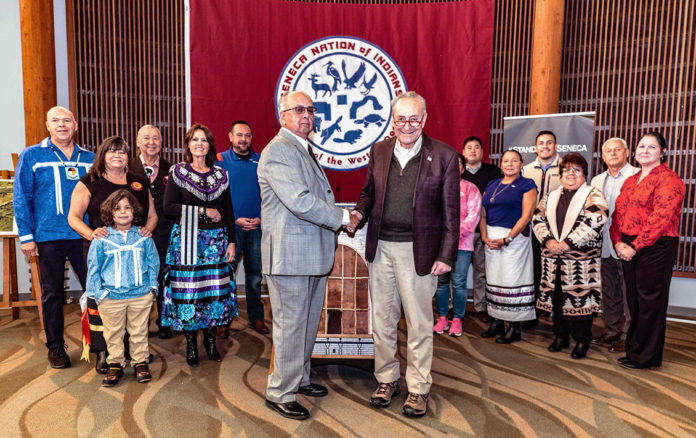
WASHINGTON, D.C. – U.S. Senate Majority Leader Charles E. Schumer announced that the Seneca Nation will receive $7,625,000 in federal funding through the U.S. Department of Transportation’s highly competitive Rebuilding American Infrastructure with Sustainability and Equity (RAISE) grant program to develop and construct a Southern Tier Regional Transit Hub. Schumer explained that the project will build a transit facility comprised of a combined transit hub and bus storage facility operated by the Seneca Nation Department of Transportation (SNDOT) and Seneca Transit System (STS) to increase accessibility, streamline bus services, and spur economic growth across the region.
“For far too long our tribal communities have had to face inadequate public transit options due to a lack of federal assistance,” said Schumer. “That is why I am proud to deliver this over $7 million investment for the Seneca Nation to create a hub for transit services between the Allegany and Cattaraugus territories and build a more equitable transportation future. The Seneca Nation’s families, businesses, and communities need and deserve a modern, easily accessible transit system, and this major federal investment, in tandem with our major wins from the Bipartisan Infrastructure & Jobs Law for our tribal communities will pave the way for new economic growth, reconnect residents, create good paying jobs, and drive the future of transportation for the region.”
“Access to reliable transportation is an important tool in helping to bridge socio-economic gaps that exist for many of our people, which can be particularly challenging in rural communities,” said Seneca Nation President Rickey Armstrong, Sr. “Our Seneca Transit System is a vital service that connects Senecas on our Cattaraugus and Allegany Territories to healthcare, employment, commerce, recreation and other needs on our territories and within the greater region. The Southern Tier Regional Transit Hub, funded by this RAISE grant, will be a transformational addition to that effort. As important, this project will serve as a gateway for improved access and connectivity throughout the region, establishing a safe, convenient and efficient link, whether people are traveling to or from Buffalo and Niagara Falls, the Chautauqua region, Cattaraugus County, or our Seneca territories.”
Specifically, the Southern Tier Regional Transit Hub, which will be located on the Cattaraugus Territory, is intended to support the expansion of transit services for the STS and regional partners across the Seneca Nation, from Salamanca to Irving. The transit hub portion of the proposed project will serve as a transfer facility at which riders will be able to connect to buses that provide regional transit services like STS, Chautauqua Area Regional Transit System (CARTS), Niagara Frontier Transportation Authority (NFTA), and other transit services that bring tourism to the area making it easier for locals and visitors alike to easily travel to other major hubs. The facility will be able to accommodate travelers with additional parking for vehicles and buses and other passenger amenities. The bus storage facility portion will provide an area for interior storage of the buses operated by the STS on a daily basis and Schumer said it will help streamline the Seneca Nation’s public transit services by increasing accessibility for residents and giving STS the one stop hub they need to keep transit running smoothly. This, Schumer explained, will allow residents of Salamanca and the Allegany Territory better transit access to the Buffalo metro area.
The Bipartisan Infrastructure & Jobs Law included $13 billion to support tribal communities over five years, including nearly $3 billion for the formula Tribal Transportation Program – and an estimated $5.9 million in formula funding over five years for the Seneca Nation of Indians, an $875 million tribal set-aside for the Bridge Formula Program and a $200 million tribal set-aside for the competitive Bridge Investment Program, $2.5 billion for charging and fueling infrastructure, and $230 million for the Public Transportation on Indian Reservations program. In the Inflation Reduction Act, Schumer supported tribal energy development by investing in the Tribal Energy Loan Guarantee Program, and increasing loan guarantees for tribal energy development from $2 billion to $20 billion. The Inflation Reduction Act also included investments for a Tribal Electrification Program specifically for tribes and tribal organizations to provide electricity to unelectrified tribal homes through zero-emission energy systems, and to transition electrified homes to zero-emission energy systems.














































